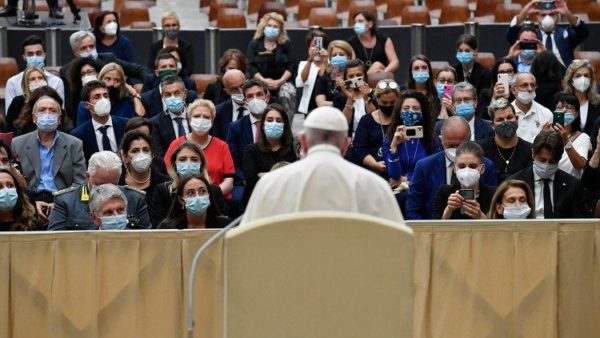Pope Francis on Friday addressed participants in the annual global meeting of the International Gynecologic Cancer Society (IGCS), which is being held online from September 10-13.
By Robin Gomes (Vaticannews)
Pope Francis on Friday reiterated the human dimension of the care of the sick, saying every patient is a person who is defined by much more than his or her clinical data. “When a sick person senses that he or she is being treated as a unique person, the result is greater confidence in the medical team and greater hope for a positive outcome,” he told participants in the annual global meeting of the International Gynecologic Cancer Society (IGCS).
Originally planned to take place in Rome, Italy, the IGCS 2020 meeting is being held digitally from September 10-13, due to the Covid-19 pandemic. The mission of the Society, which has over 1,000 members representing more than 80 countries, is to enhance the care of women with gynecologic cancer worldwide through education and training and public awareness.
Forging relationships
Addressing the participants, the Holy Father underscored the importance of forging bonds of solidarity and support between patients suffering from serious pathologies, their family members and medical personnel. He encouraged the participants to concentrate on the integral care of patients, by offering them trust, hope and love in every stage of care, including in cases where the treatment is essentially palliative. The Pope said, it is precisely the closeness of love that opens the door to hope and also to healing.
“It is often stated, and rightly so,” the Pope pointed out, “that a good relationship with healthcare personnel is itself part of the cure.” The possibility for the sick to be able to open their hearts to others about their condition and needs, and also to cry with confidence, the Pope said, opens up horizons, helps healing or at least bring relief to the terminally ill.
He regretted that the human dimension of the care of the sick is all too often left to the kindness of the individual physician, rather than being considered an integral part of the services offered by healthcare facilities.
Priority to the human person
Financial concerns, he said, should not override the need for building relationships with patients. While significant financial resources are needed for research, a sound balance must be struck between various factors so that priority is always be given to people – in this case, women suffering from serious illnesses. Healthcare èersonnel who care for them daily also need to be ensured they can carry out their work in dignified conditions.
Need for one another
Finally, the Holy Father told the meeting participants that the women they care for and treat remind us of the precariousness of our existence, our need for one another, the vanity of self-centredness, and the reality of death as part of life itself. While reminding us about our need to entrust ourselves to God, the Pope said, sickness also reminds us of the importance of closeness, and of our need to be neighbours to one another, as Jesus taught in the parable of the Good Samaritan.







